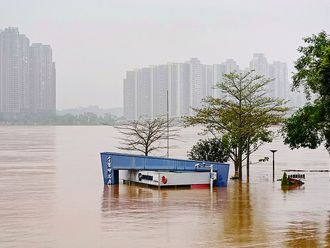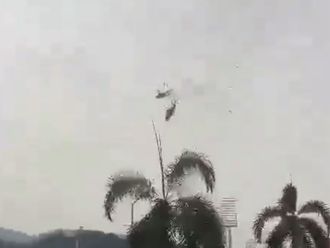Seoul: North Korea blamed US “nuclear blackmail” for soaring tensions over its weapons programme in rare meetings with a senior UN official, but agreed to regular communication with the organisation, state media said Saturday.
Jeffrey Feltman arrived in Beijing Saturday after wrapping up a five-day visit to Pyongyang aimed at defusing the crisis, just a week after North Korea said it test-fired a new ballistic missile capable of reaching the United States.
His trip - the first by a UN diplomat of his rank since 2010 - saw him meet Foreign Minister Ri Yong-Ho and vice foreign minister Pak Myong-Kuk, the North’s state news agency KCNA said.
“At these meetings, our side said the US policy of hostility toward the DPRK (North Korea) and its nuclear blackmail are to blame for the current tense situation on the Korean peninsula,” the report said.
It added that the North had agreed with the UN “to regularise communications through visits at various levels”.
The report did not mention any meetings with leader Kim Jong-Un, who has ramped up his impoverished nation’s missile and nuclear programme in recent years in order to achieve Pyongyang’s stated goal of developing a warhead capable of hitting the US mainland.
Feltman, the UN’s under secretary general for political affairs, visited the country just after the United States and South Korea launched their biggest-ever joint air exercise.
Pyongyang reiterated its view that these manoeuvres were a provocation on Saturday, accusing the drills of “revealing its intention to mount a surprise nuclear pre-emptive strike against the DPRK”, using the acronym for the country’s official name.
The UN Security Council has hit the isolated and impoverished North with a package of sanctions over its increasingly powerful missile and nuclear tests, which have rattled Washington and its regional allies South Korea and Japan.
Early Saturday Feltman flew to Beijing, a key transit point with the North, and left the city’s airport without speaking to reporters.
China, which is Pyongyang’s sole major diplomatic and military ally, has called on the United States to freeze military drills and North Korea to halt weapons tests to calm tensions.
The UN political affairs chief expressed willingness to ease tension on the Korean peninsula during a visit to North Korea this week, state media said on Saturday, amid a rising war of words over the North’s missile and nuclear programmes.
North Korea also said in a statement carried by its official KCNA news agency that the UN envoy acknowledged the negative impact of sanctions on humanitarian aid to North Korea.
Jeffrey Feltman, the highest-level UN official to visit North Korea since 2012, did not speak to reporters upon arriving back from Pyongyang at Beijing airport on Saturday morning.
“The United Nations expressed concerns over the heightened situation on the Korean peninsula and expressed willingness to work on easing tensions on the Korean peninsula in accordance with the UN Charter which is based on international peace and security,” KCNA said.
Speaking at an academic forum, Chinese Foreign Minister Wang Yi said the situation on the Korean peninsula had entered a vicious circle of shows of strength and confrontation, and the outlook was not optimistic, China’s Foreign Ministry said in a statement.
“But at the same time it can be seen that hopes for peace have yet to extinguished. The prospects for negotiations still exist, and the option of resorting to force cannot be accepted,” Wang was quoted as saying. North Korea is pursuing nuclear and missile weapons programmes in defiance of UN sanctions and international condemnation.
On November 29, it test-fired an intercontinental ballistic missile which it said was its most advanced yet, capable of reaching the mainland United States.
The United States and South Korea conducted large-scale military drills this week, which the North said have made the outbreak of war “an established fact”.
KCNA said North Korean officials and Feltman agreed that his visit helped deepen understanding and that they agreed to communicate regularly.
Last month’s missile test prompted a US warning that North Korea’s leadership would be “utterly destroyed” if war were to break out. The Pentagon has mounted repeated shows of force after North Korean tests.
North Korea regularly threatens to destroy South Korea and the United States and says its weapons programmes are necessary to counter U.S. aggression. The United States stations 28,500 troops in the South, a legacy of the 1950-53 Korean War.












